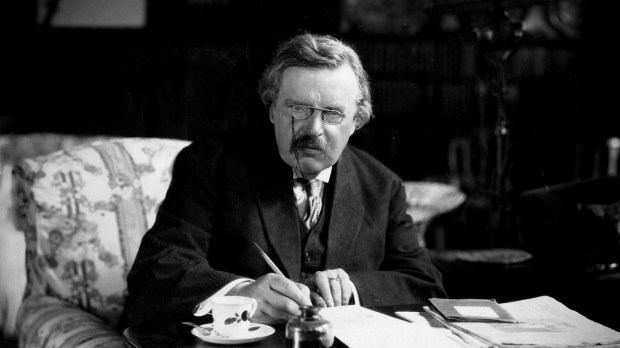In a modern culture that is adrift, it is good to be reminded of the true, the good and the beautiful. Each week it is my humble privilege to offer one selection from an indispensable canon of essays, speeches and books that will light a candle in the darkness. It is a canon I have assembled over many years that I hope will challenge and inspire each reader. But most importantly, I hope it will remind us of what is true in an age of untruth. And if we know what is true, we are more apt to do what is right.
Why I Am A Catholic, by G. K. Chesterton
“It is impossible to be just to the Catholic Church. The moment men cease to pull against it, they feel a tug toward it. The moment they cease to shout it down, they begin to listen to it with pleasure. The moment they try to be fair to it, they begin to be fond of it.”
It was 1926 when the mirthful, insightful British writer G. K. Chesterton penned these words. And he meant them. Because four years earlier, in his 48th year, Chesterton became a Catholic. After being raised in an ostensibly Unitarian household dedicated more to living the golden rule than worshiping the Triune God, Chesterton felt the tug, began to listen and then became fond of the Catholic Church. But what did he find? What did Chesterton encounter once within the Church he described as “larger on the inside than it is on the outside.” And what exactly made this brilliant and enlightened thinker join an institution maligned as being outdated and dogmatic?
In his 1926 essay, Why I Am a Catholic, Chesterton would tell us.
The difficulty of explaining “why I am a Catholic” is that there are ten thousand reasons all amounting to one reason: that Catholicism is true. I could fill all my space with separate sentences each beginning with the words, “It is the only thing that …” As, for instance, (1) It is the only thing that really prevents a sin from being a secret. (2) It is the only thing in which the superior cannot be superior, in the sense of supercilious. (3) It is the only thing that frees a man from the degrading slavery of being a child of his age. (4) It is the only thing that talks as if it were the truth; as if it were a real messenger refusing to tamper with a real message … The Church does often set herself against the fashion of this world that passes away; and she has experience enough to know how very rapidly it does pass away … Nine out of ten of what we call new ideas are simply old mistakes. The Catholic Church has for one of her chief duties that of preventing people from making those old mistakes; from making them over and over again forever, as people always do if they are left to themselves …
There is no other case of one continuous intelligent institution that has been thinking about thinking for two thousand years. Its experience naturally covers nearly all experiences; and especially nearly all errors. The result is a map in which all the blind alleys and bad roads are clearly marked, all the ways that have been shown to be worthless by the best of all evidence: the evidence of those who have gone down them. … But [the Church] does definitely take the responsibility of marking certain roads as leading nowhere or leading to destruction, to a blank wall, or a sheer precipice. By this means, it does prevent men from wasting their time or losing their lives upon paths that have been found futile or disastrous again and again in the past, but which might otherwise entrap travelers again and again in the future. The Church does make herself responsible for warning her people against these; and upon these the real issue of the case depends. She does dogmatically defend humanity from its worst foes, those hoary and horrible and devouring monsters of the old mistakes … Now there is no other corporate mind in the world that is thus on the watch to prevent minds from going wrong. The policeman comes too late when he tries to prevent men from going wrong. The doctor comes too late, for he only comes to lock up a madman, not to advise a sane man on how not to go mad … Every moment increases for us the moral necessity for such an immortal mind. We must have something that will hold the four corners of the world still …
G. K. Chesterton found that “something”: The enduring truth, the exhilarating goodness and the ineffable beauty of the Catholic Church. And he found it by being fair to it.
Fairness.
What a novel idea.
To read Why I Am a Catholic in full, please visit this link to the American Chesterton Society.
TodWorneris a husband, father, Catholic convert and practicing internal medicine physician. He blogs for Patheos asA Catholic Thinker.

